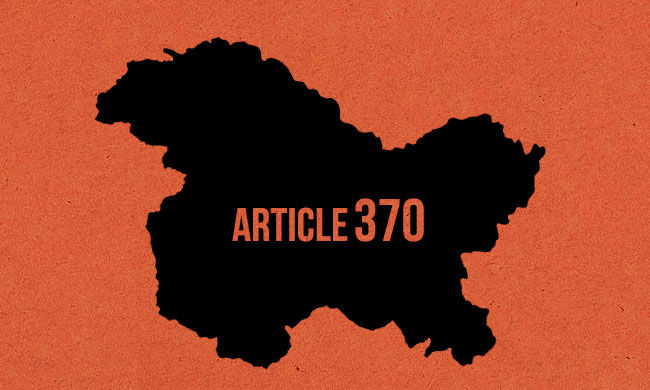
Nearly four years after its abrogation, the Supreme court of India is hearing the petitions challenging the abrogation of the special status of Jammu Kashmir on Wednesday (August 02).
Several petitions including those filed by Jammu Kashmir’s pro-establishment groups have challenged the BJP Government’s revocation of Articles 35a and 370 on August 05, 2019.
Earlier, the Supreme court disregarded a fresh affidavit filed by the central Government mentioning the “development” that had taken place in the region following the decision.
The judges had said that the legality of the decision has been challenged, not the aftermath of it.
Five-judge Constitution bench of the Supreme Court led by CJI DY Chandrachud to commence hearing a batch of petitions challenging the abrogation of Article 370 of the Constitution.
On board are 20 petitions challenging the Central government’s decision to abrogate Article 370 of the Constitution, which resulted in the revocation of Jammu and Kashmir’s special status. The erstwhile State was subsequently bifurcated into two Union Territories.
Political parties in Jammu Kashmir, including the locals have their eyes fixed at what happens at the Supreme court hearings.
Live Updates
10:45 A.M. The Constitution bench assembles #Article370
10:47 A.M: Omar Abdullah reaches the supreme court. “My first time at the Supreme Court. I’m here today to see Kapil Sibal begin the arguments in the case challenging the events of 5th Aug 2019,” says Omar Abdullah.
10:49 A.M: Adv Kapil Sibal begins: This is a historical moment in many ways. This court will be analysing why history was tossed out on August 6, 2019 and whether procedure adopted by parliament was consistent with what democracy stands for.. whether will of J&K people can be silenced.. it is historic because it has taken 5 years for this court to hear this case and for 5 years there has been no representative government there..This article which sought to restore democracy… it has been decimated and can that be done.
11:20 A.M: The Parliament does not have the power to convert itself into the constituent assembly. Only the constituent assembly could have ammended the Articles. The constituent assembly was called after India’s independence to discuss the “future” of the states not their past or their merger conditions with India, says Kapil Sibal.
12:01 P.M: Article 370 is being heard in Supreme Court from today. Have we made ourselves being heard? Sibal continues his opening remarks.
12:44 P.M: Special status of Jammu Kashmir eas temporary from 1951 to 1956. The constituent assembly stopped functioning in 1956, hence it became permanent. Only the state’s elected legislature can make ammendments. State’s legislature cannot also abrogate the Article 370.
12:47 P.M: Article 356 cited by the Government of India is a temporary power, it cannot be used to abrogate the Article 370.
2:10 P.M: Court resumes after lunch, Sibal begins arguments.
CJI: Suppose in the area of union or concurrent something is not covered by subjects under instruments of accession.. state legislature is operating on state list..
Sibal: and the residuary powers..
CJI: but is this part of the instrument of accession..
Sibal: I will show how residuary part was with the state govt throughout..
Justice Khanna: for the time being leave the proviso..
Sibal: i cannot read the constitution in this fashion.. i cannot read an act also like this.. proviso is staring at us..proviso has been interpreted since 1950s
CJI: proviso at times can be an exception and at times it can be an elaboration
Sibal: Jammu Kashmir is an exception and so is Article 370. You cannot read other articles to mention it was a temporary provision.
CJI: we are merely raising the questions to understand.
Sibal: Yes, we all are trying to. It’s not a simple issue. Jammu Kashmir has its own constitution, which was accepted the constituent assembly and the union of India.
3:05 P.M: Sibal: “It is one of our commitments to the people and government of Kashmir that no such additions should be made except with the consent of the Constituent Assembly…” This is a commitment made!
Sibal : We in hindsight sitting in 2023 cannot interpret a provision except on its terms. we cannot legitimise a process which is in violation of the express terms of the constitution. We’re here to interpret the constitution. We’re not here to legitimise a process which is inconsistent with the express terms of the Constitution.
3:30 P.M: Former Jammu Kashmir Chief Minister Mehbooba Mufti said the entire world was watching the Supreme Court hear the petitions challenging the abrogation of provisions of Article 370, and “will get to decide whether India has to run as per Constitution or the agenda of particular party”.
3:40 P.M: Not only boundaries were changed, it was for the first time in India’s history that a state was converted into a Union Territory.. you move away from representative democracy and you put under executive control.
3:45 PM: It can be political act cannot be but cannot be exercised by the parliament..they had no authority to do this when the constitution had come into force.




